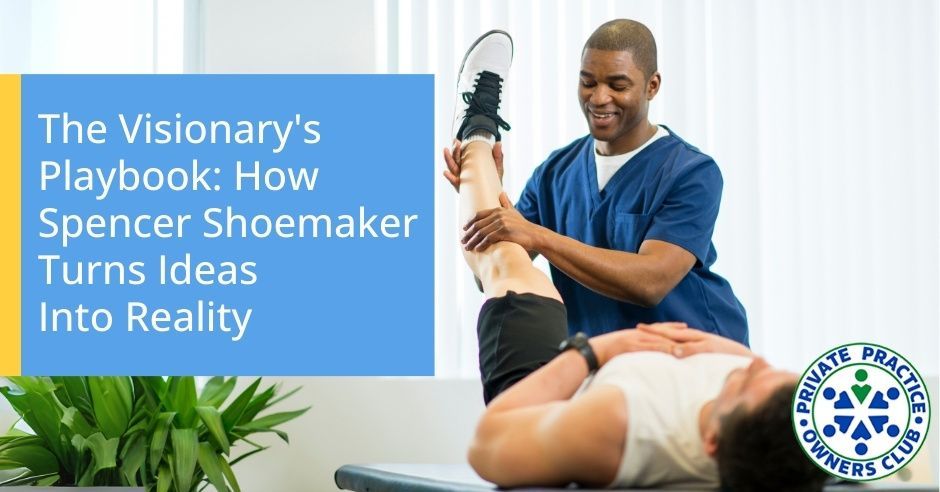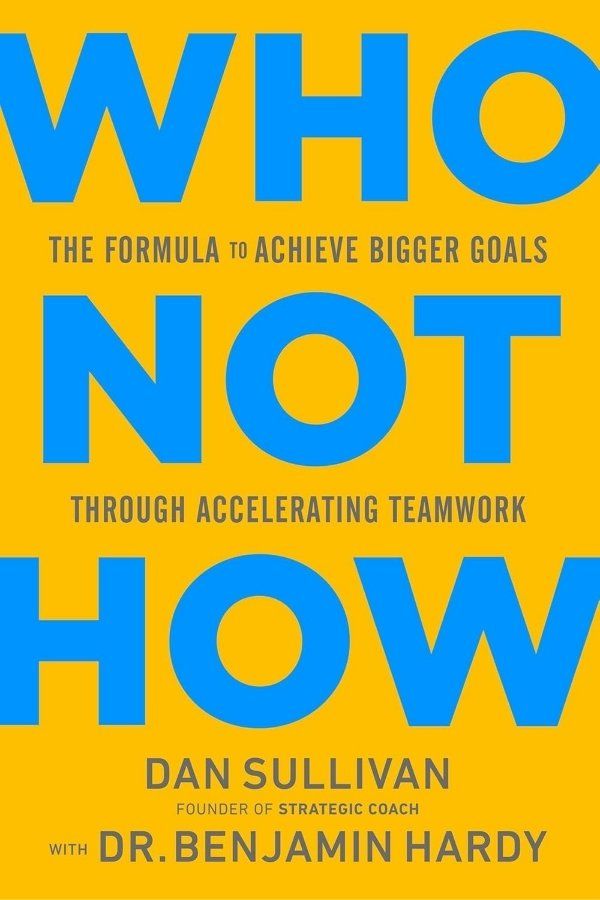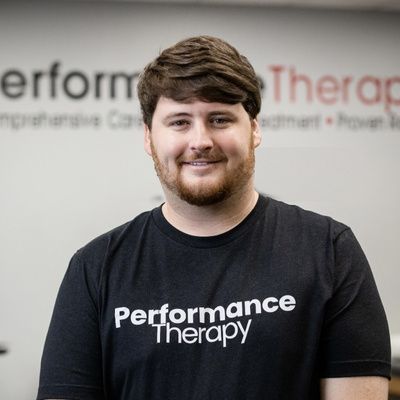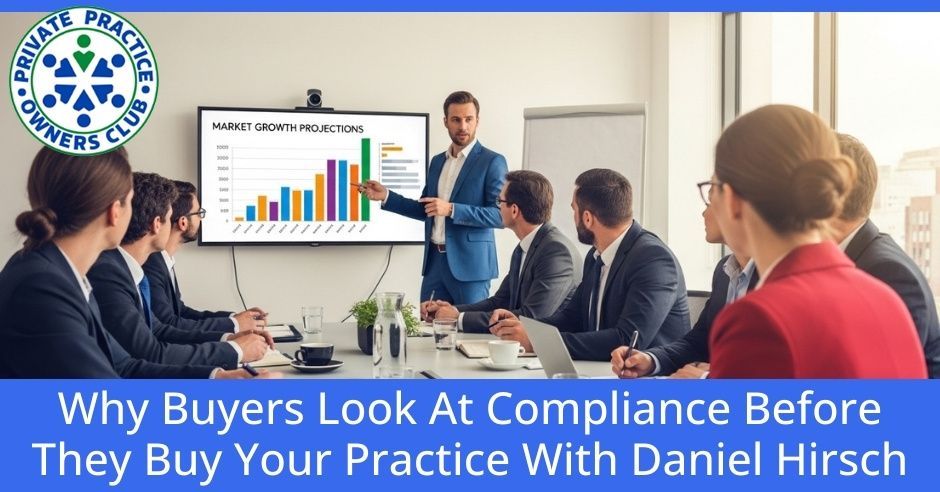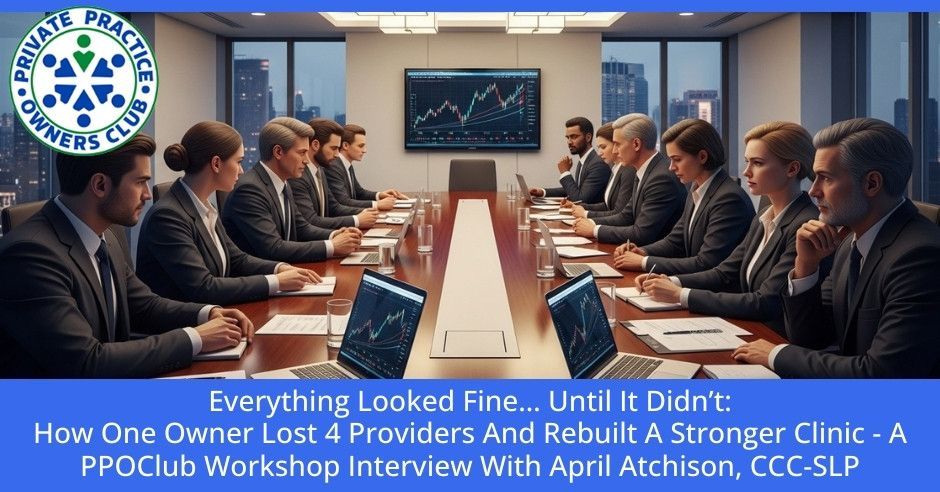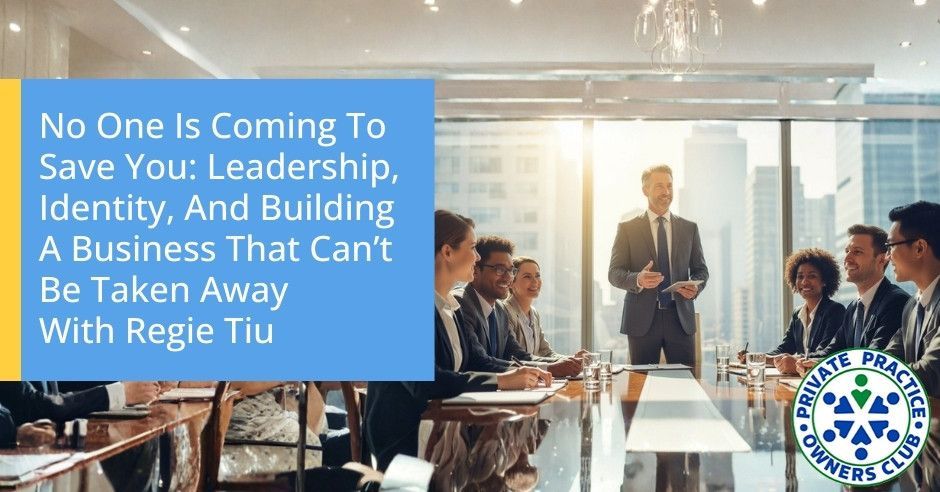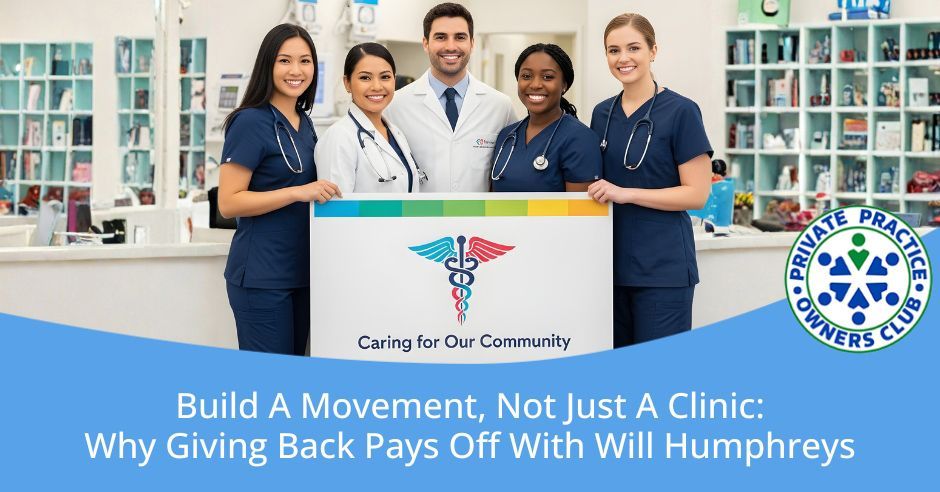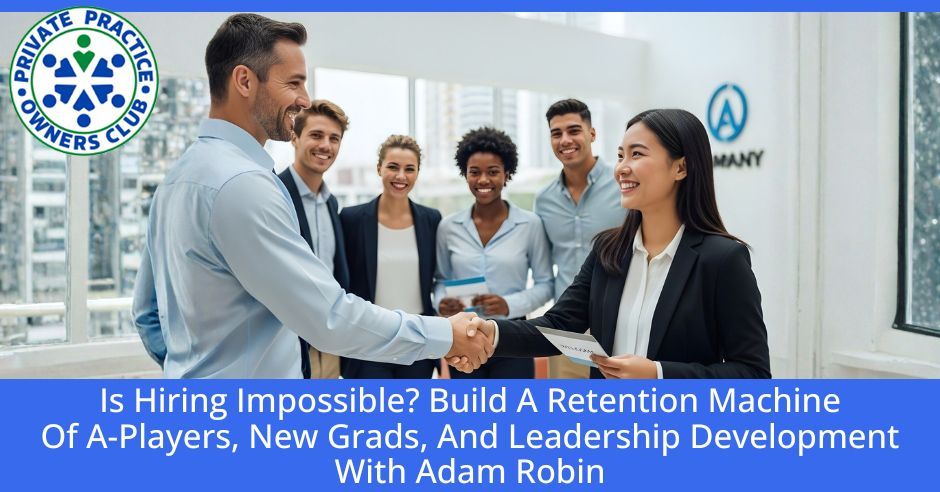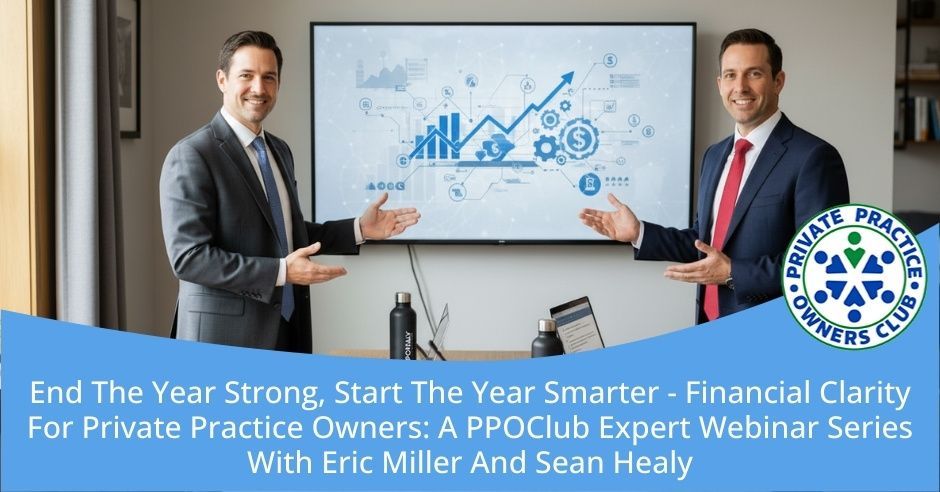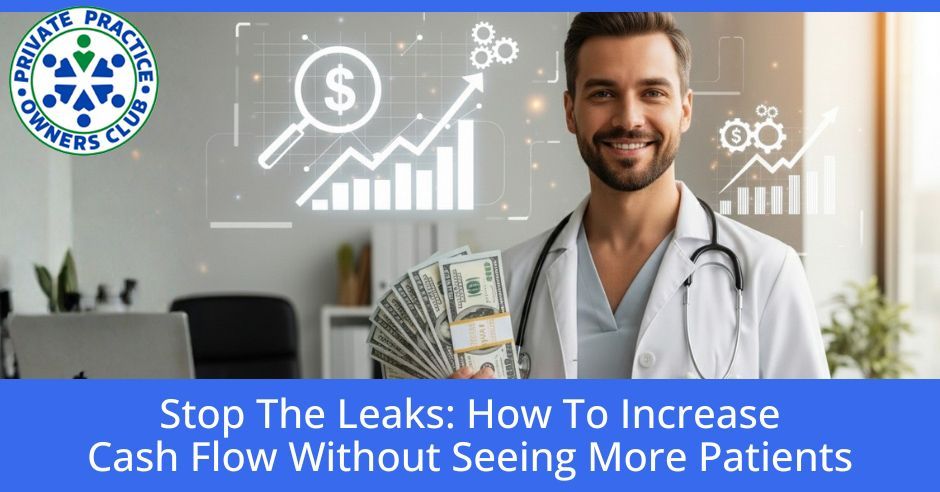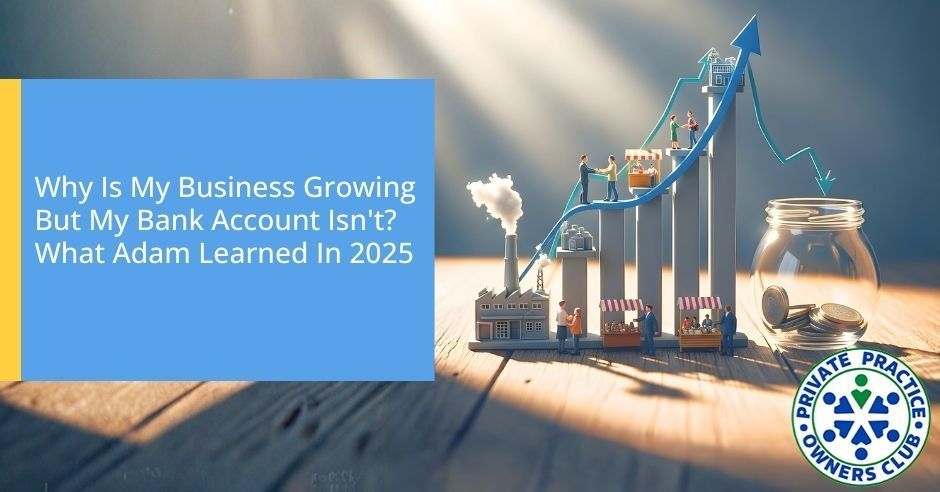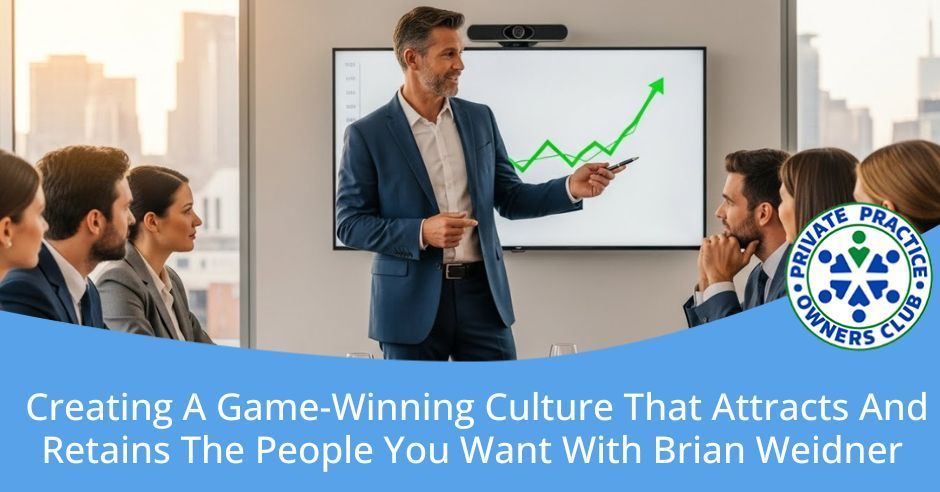Spencer Shoemaker took
Performance Therapy from 5 clinics to 23 in just a few years expanding across multiple specialties including pediatrics, OT, speech, ABA, chiropractic, pelvic health, and sports performance. His growth hasn’t come from luck, it’s come from vision, tough leadership, and the ability to find the right people to bring ideas to life.
In this episode of the Private Practice Owners Club Podcast, Nathan Shields sits down with Spencer to unpack how visionaries can turn ideas into reality without getting buried in the details.
They dive into:
● The visionary trap most owners fall into (and how to avoid shiny object syndrome)
● Why holding providers accountable to KPIs is non-negotiable
● How to recruit and align top talent around your vision
● The “Who, not How” mindset that unlocks rapid expansion
● Practical steps for testing and launching new specialties inside your practice
If you’ve ever felt stuck between having big ideas and actually executing them, this conversation is the playbook.
🎙️ And don’t miss Spencer live at the Private Practice Owners Club Conference, October 2–4, 2025, in Destin, FL, where he’ll go deeper on building team buy-in and leading through growth.
👉 Register now at ppoclubevents.com/homepage
---
Listen to the Podcast here
The Visionary's Playbook: How Spencer Shoemaker Turns Ideas Into Reality
I have another guest who is going to be a speaker at the Private Practice Owners Club Conference in October 2 through 4, 2025, in Dustin, Florida. Check it out at the homepage, PPOClubEvents.com. Spencer Shoemaker
is joining us. Spencer is a good friend of Adam's and Adam has been speaking up Spencer for a couple of years now because he has witnessed exactly how much influence and impact Spencer has made in Mississippi. Spencer, just to give you a little taste, has taken their company Performance Therapy from five clinics to 23 over the years and has included in multiple specialties within that time. He is the COO of Performance Therapy.
---
Spencer, thanks for joining us.
Absolutely.
It's good to have you, especially considering how much you've done with your company at Performance Therapy. We will dive into it a little bit more or a lot more when we're at the conference in October, exactly how you get team buy-in. We might get into it a little bit here, but with what you've done in your role as COO in the organization, you shared with me just before we started, you opened the fifth clinic and you guys were outpatient orthopedic companies or clinics. You opened this fifth one, but since then, you've gone on to build up into the CEO role and expand that more and you've brought on what pediatrics and what else?
From Staff Role To CEO: Spencer's Origin Story In Physical Therapy
I’m still COO of the company. We've got an original owner, Dan Young, who's still there. He opened the company from scratch. I came on, I was out of school eighteen months and knew that I had like a hunger to do a little bit more than just a staff role. I started off as a corporate staff therapist, pretty much, a corporate company staff therapist and just knew I always had a little hunger for more than that.
Performance and Dan gave me my first chance and actually, Scott Huffman, who passed away, is one of my partners as well. They gave me my first chance as a director of a small clinic that I went to high school. It was a really small town in Pelahatchie, Mississippi. It gave me a little room to fail and to then turn that into a little success.
Even with the one clinic, it was still like, “This is awesome.” Once we figured it out and it started going well, it's like, “What else can we do?” I ended up moving into my hometown to open a clinic, Brandon, Mississippi. I was welcomed by the town and the community with open arms and we were the only private practice. Everything else was attached to a corporation.
I was scared to death, but honestly, it probably helped because you weren't affiliated with anyone. You're going to get a few crumbs from every ortho group or urgent care or whatever. They're like, “We'll give him a couple.” It was what you're going to do with that. We surrounded ourselves with the right staff members who also had community buy-in, as we all started rowing in the same direction.
The clinic just started growing and growing and that clinic in Brandon was the seventh clinic in Brandon. It's a town of 25,000 people. It was like, “This may or may not go well but we're going to try it.” Now they just opened a third clinic. Several clinics have closed. There's us, there's a corporate clinic and then there's a clinic attached to an orthopedic clinic nearby. It's just us three now and it's been awesome. From there, I just had this hunger to do a little bit more and it was like, “What kind of specialties can we add?” We started off with pediatrics.
When you say pediatrics, you brought on OT and speech?
Yeah, so actually, it was all people that I knew or had come in contact with throughout. Our peds PT was one of my clinical instructors during PT school and she had this little corner set up where she wanted to do peds in this really small town in Mississippi, but there just wasn't a huge need. I called her and I'm like, “What do you think about doing it in Brandon?” That is where she lived as well. She's like, “I'm game.” My wife is an OT, so she was the one who came on as we started pediatrics for that clinic in Brandon. We brought on an SLP as well. We grew it from those three disciplines to before we expanded, I think we may have had 2 or 3 of each discipline before we expanded into the next suite.
It was all the people that we knew, people that we trusted. You didn't really have to sell hard. It was like we already have this sense of trust with everybody in the room. You didn't really have to gain that. That was super helpful for the trajectory of my career just to figure out like, “People will be completely honest with me if they know me.” Let me ask them before we start measuring stats, “What's too much here? What percentage is too much? I'm going to be upfront about the financials of this. I need you to be upfront about the clinician side of this.” Being able to have those full-scale conversations with no filters with super helpful because I was scared to death to start throwing stats on people.
The Power of Tough Conversations: Leading with Transparency
Yeah. I recognize really quickly from the conversation we had before we started, now you've got a superpower for being a visionary and a lot of small business owners have that same superpower to the extent that it can be a detriment, the shiny object syndrome and be a distraction. You have that visionary that's there, but what you're talking about on the managerial side.
This is interesting to me because maybe because I'm sensitive to it, I’ve been thinking about it and reading about it a little bit more. One of the things that really can hold owners, leaders and managers back, whoever it is that has a team underneath them, is being scared to have those conversations about KPIs. It’s like, “I know what we need to hit and you need to hit it. Are you okay with that?” It sounds like that's the conversation you're talking about right there.
There's that fear. Of course, the fear for most owners out there is that if they put that kind of pressure on their providers, the providers's going to leave. In this environment where it's hard to get providers, the last thing you want is to make them leave. The worst thing you can do for your business is to allow them to be unproductive and losing money and thus, the company becomes at risk of being insolvent.
You have a side to you and that's obvious to me and it's one of the reasons why you've grown so much. Maybe you don't care about the feelings around that conversation or the emotion around that conversation. You know the conversation needs to be had in spite of the emotion that might be tied to it. Is that about right?
I think I told you before we started, I think we've got maybe 40 staff members now at just this location. I feel like I psyched myself out so many times before some of the conversations had to be had. Typically, right after the conversation was had, whether it was a conversation where you saw something in somebody that they may not see yet, like a positive and you wanted to share that, I never had trouble sharing that.
It was the ones that people that you really like, people that you really trust, people that you've really grown with, you're always willing to share the positives with, but you don't want to hurt feelings per se. You're nervous about the negative conversations. Typically, what I realized after those negative conversations, I would try like a positive sandwich.
Give them something good, give them what we need to work on and then give them something good because I mean great employees, even though everybody is not strong at everything they do, it doesn't mean we don't focus on the strengths. Typically, it would come to a head where people were like, “What do you mean? I thought that you said that I'm already good at all these things. Why am I not being promoted?” It's like, “It's because we didn't focus on the things that needed polishing.” After several of those conversations that I would avoid the hard conversations on and just give them the good, not that anybody had like a big head coming into work, but everybody's like, “I'm perfect at whatever I do,” and if it were me, I'd probably be the same way.
You could give somebody something to work on or if you could give them like, “this is what I see your strengths are, maybe you're not as strong as at this part, or maybe this isn't your personality, but that's okay because we can focus in on this and allow somebody else to handle this.” Once we had enough of those conversations, finally, I just started being upfront. I'm like, “This is what you're really good at. I don't think that you or your personality or whatever would enjoy this side of things and that's okay because I don't need you to be good at everything. I need you to be good at this lane.” I'd go to the next person, “That's okay. I need you to be good at this lane.”
I thought that I was helping by just focusing on the positive. Everybody's happy, but then I realized I was doing them a disservice by not giving them a reason why they weren't moving into a certain role or taking on a certain task. Not that I wanted them to take it on, but I needed to tell them that. There was a sense of huge care and anxiety on the front end that, yeah, at some point, I knew in my vision, I knew in my spirit what was best for our company and what was best for even them.
In my mind, I knew this is what they're really good at. I feel like they'd be really good at this role. Now we have to get there. Even vision on sharing what people are not good at, I don't love that, but it's necessary at times. I feel like at some point, it got hardened and just said, “I'm just going to lay it all out there.” That was a huge turning point.
Growth Through Accountability: The Leader's Role In Scaling
This is a very common characteristic of leaders who grow at scale and are successful. You alluded to it a little bit that you recognize that for the benefit of the organization, these conversations need to be had and you needed to push through that. I can understand your hesitancy because we've never really been trained on how to have those conversations. We know how to treat a post-op knee or a stutter or whatever it might be.
We don't know how to hold someone accountable and show them the weaknesses and put a mirror up and say, “You need to work on this.” I can imagine those first few conversations. You probably tripped over your words a little bit, and weren't totally comfortable. You were probably sweating a little bit.
I probably didn't say everything that needed to be said.
I'm assuming at this point, you're able to just go straight at it because you've seen the benefits of having those hard conversations. Obviously, on the backend, now you have the social proof that shows Spencer's had those conversations and his company has done X number of growth, thousands of percentages of growth over the past few years, probably not just because of your vision, but because you're having these conversations and you know the KPIs you need to hold people to.
On top of vision, there are a lot of KPIs and there are a lot of surveys that you can take that you're like, “I need to open this many clinics and this length of time and this is the financials that'll come with it.” Realistically, we're a private practice. We're not corporately backed. It's like you're basically taking a bet on yourself every time you open.
Realistically, we're private practice, not corporately backed, so you're basically taking a bet on yourself every time you open.
I'd say a huge portion of the reason for our growth is the people that we've hired, whether that's the local director that everybody already knows and they just want a little clarity on vision or they want company that they align with better than their current company. We will scoop them up and be like, “We want you to have, a little bit of your own personality inside your clinic.” We don't want this cookie cutter clinic. I think that that's been a huge part of it.
I think that the people that even those directors have hired on underneath them to give them vision buy-in. I may have company vision, but I feel like every director at every location has to have community vision for their clinic to be successful. They've got to help choose the people underneath them that are going to help them get there as well. Stroke their weaknesses. Where they're weak, they're strong. I think that I may be able to be a puzzle piece that helps fit a few things together, but I would rely heavily on the reason for our growth and our success has been the team around us.
Let me just do a real quick aside, because people might be asking, do you have a secret sauce to your recruiting of providers? Some of those people are in their hometowns, but you have had to go outside of their hometowns to bring people in. Have you found a secret sauce in that recruiting dilemma?
I know I'm being repetitive on it, but I feel like our secret sauce is that again, like obviously, the company reputation has been huge.
You've got a reputation at this point that precedes you.
When patients are talking, they're like, “This is where I'm going to go.” It's also the same with staff. They're like, “They take care of their employees.” They know us. We may have 200-plus employees, but they know us and they know what's going on to an extent in our lives and they check in and they're not sitting in some glass office somewhere.
I feel like if you walk into a clinic, it's hard to see yourself in someone else's eyes. To me, I'm the same person that opened that clinic in town of 1,500 in Pelahatchie. We saw, I don't know, 65 visits a week and it was like we were winning to walking into a clinic now that they've got eight staff members and they're like, “What is he here for?”
I don't see it that way, but I want to try to take into account that they may. I just want to be buddies with them. Obviously, there's some management that needs to happen, but I want to know them. I want them to open up to me. Every clinic that we go into, I want it to have a personal feel and I feel like that's carried us because all of our owners and a lot of our staff members have that same feel.
Beyond Ortho: Diversifying Into New Specialties
To come back off of that tangent, you're a visionary person, you've got these ideas and you've brought in a number of specialties. Peds. You say ABA, but I don't know what ABA stands for.
Applied Behavioral Analysis or Analyst. It's a heavy autistic population. It's inside of our pediatric department. You hire BCBA or an RBT. It was brought them alongside to complement what we were doing already with PTOT and speech and there was nobody in the state doing all inclusive clinic. We were having patients come in, they'd get their three services and then they'd have to leave and go to ABA somewhere else.
It's not the same. It's more like behavioral. It's not therapy. When you talk about insurance contracts, you're not asking for a therapy contract. You're looking for a behavioral and it's completely different. The billing's different, the codes are different. It was one of those things that we didn't really know about. We knew about it, but we didn't know much about the intricacies of it. We wanted to find that person that had passion for ABA and seeing ABA grow statewide.
They had a vision for it and they wanted a vehicle to help get them there. We brought her on and in three months, we probably have 100 patient wait lists. It's been controlled growth because we don't want to hire the wrong people. We don't want to onboard their own clients. Also, we had just expanded our pediatrics. We had 3,000 square feet, we bumped it to 4,200 square feet. We're like, “We're already tight inside these 4,200 square feet. We need to expand one more time before we let ABA.” We just bought a strip center and as the leases expire, we're about to expand and then we'll allow ABA to expand a little bit more as well.
You got the ABA, but you've also brought on Cairo Pelvic Health and you got a sports component in a 1 or 2 or more of your clinics. As you're looking at these different things, what gives you the courage and the brain space to move forward on this? Many people can have ideas, but when I think of some of the visionary ideas I have, I get bogged down because I have this feeling like I’ve got to do it all. All of a sudden, now my enthusiasm about that vision has dampened. You're able to move forward. How do you do that?
Honestly, the vision is what energizes me. Throughout the vision, it's not just a, “I have an idea, let's bring on pelvic health.” I obsess over it and there will be moments in time that I won't sleep. I’ll just stay up all night like drawing out these master plans. You read them the next morning and it's like in Spanish because it was 3:00 AM.
The vision is what energizes.
Typically, the vision involves in the vision targeting someone who we feel would be perfect for this role. Is it someone within the organization or is it someone outside of it? If it's inside the organization, you set up a meeting and you go up to them like, “I’ve got a crazy idea and you humor me for just a minute and you can share some of it and if it lands, let's have a conversation.”
If they're like, “That's the craziest thing I’ve ever heard and I'm not interested,” then you're like, “Why did I just stay up for three days thinking about this vision?” For me, I can't get past it. I feel like the Lord places that on my heart and we will not let it go until it comes to fruition. If it's not that, we've got to figure out what the next path is.
That's how pelvic health happened. We brought it from within. It was one of our directors that was doing nothing but ortho. She had a couple of babies and I just feel like she's so good at ortho, she's never going to want to do this. I went and met with her and she's like, “That's the craziest thing. I’ve been having dreams about doing pelvic health because I’ve been going to pelvic health after having my baby. I feel like I'd be so good at it.”
That's how she became the director of pelvic. We've got like a baseball specialty and that was more outside the company. There was a clinic probably 45 minutes away that was fully specializing in technology and arm care and mechanics and all the things. I like baseball. I didn't play baseball, but one of the biggest needs when we opened our clinic in town was, we got all the baseball players. I'm like, “All right, I’ll just figure it out.”
I didn't know enough about it to specialize in it. He's nearing 60 and I'm like, “He's never going to want to sell. He owns his own company and if he does want to sell, he's never going to see the vision of what we're doing.” We went and had one lunch with him, he's like, “I'm in, let's talk.” It's like, “We need to figure this out. We need to figure out how to buy his clinic.”
We bought his clinic and named him the director of baseball development for our company. Now our goal for him, we've got 23 locations, like, “Choose which one you feel like would be received the best unless train someone and put them there so that you don't have to do all of it.” Just walking alongside him for the growth. Chiropractor, similar to ABA. Similar stories.
The "Who Not How" Approach To Visionary Growth
Spencer, did you ever read the book Who Not How?
From Vision to Action: The First Steps After Alignment
However, you had a who in mind. If it's not that person, you know you need to find the who if they're external. The vision's not going to happen for you, you tell me, until you find that person. Vision really doesn't move forward until you find that. You could have all the ideas, but you don't really move forward all that much until you find that person. Does that sound right?
Yeah. Honestly, like ABA, we wanted to bring that on a couple of years ago, but we didn't have space then. We had started searching and honestly didn't find the person until about the time we could have expanded anyway. It was like the timing always just seems to work out. As far as it goes, when the timing's starting to work out and there's vision and there's people in mind, we're batting 1,000 like on the who and crushed it.
You guys are aligned, 100%. You've got a vision, they've got a vision and you probably at that point are buying into their vision. Now at this point, you have an idea, but they might know some of the specifics that you don't and you're now letting them flourish within their own vision.
We've got the shell and we've got the means. I want you to come in and help. I was never like a systems guy. That always just wore me down. Adam Robin has worn me down about that and just showed me how important it is. It may not be like pelvic health even, or baseball or Cairo or whatever it is. That may not be my specialty, but I'm going to come alongside you at the beginning and we're going to develop every portion of that system. Learning a little bit from him, there are ideas that we kick back and forth, but even coming along as a partner with him, like sitting in on a Zoom, it's like he breathes systems now. This is important for him. A little of that stripped off onto me as well.
We don't have to go down that road too far. Once you find that person, you share the vision. What are just maybe 1 or 2 next steps if people are like, “I’ve got a vision and I’ve got some people I want to talk to?” What can they foresee or what do you expect in those first couple of steps after aligning on the vision?
I’ve been obsessing over it for a month or so, so I’ve thought there were a lot of things.
You've got a bunch of ideas to get off your chest.
Yeah. It's like, “This isn't my thing.” I want them to have a little say so and personality within it as well. Just pitch the idea, see if it lands. Let's schedule a follow up meeting just to see how it landed and what kind of questions or follow ups. They typically come back with some vision of their own because they may not have known that was even a possibility. They haven't really thought through it.
Some people have like dreams and aspirations to eventually get there and you hit them with the, “Let's do it.” They're like, “Let me get all that back together and let's organize it.” Typically, we'll have a follow-up meeting and I’ll hear out concerns, questions, “What do we need to start? When can we start?” If it's somebody from within the company, if we're replacing that position, we've got to find that person before this can start. It's like, “Let's go to the background. Let's make sure all our bases are covered and let's dream together.”
This might not be all in the same session that you're talking about, but do you do a little bit of dreaming as to where this could be in five years or where do you want to be by the end of the year? Do you put some of those things in place just yet or are you still just feeling things out about how it's going to work?
Typically, I’ll cast a huge vision for them. I could see this company-wide just in our initial talk.
You said you're going to have ABA across Mississippi.
Yeah, so like Chelsea, our director of ABA services that just came on, in our intro launch, we hadn't even offered her job yet, we just told her what our vision for ABA was. It's like, “I'm not telling you this has to happen, but we opened these two clinics with extra square footage just in case this happened.” She's like, “Yeah.” You cast the vision, you even aim high.
I think there's several quotes out there, but if you keep pushing yourself harder and you're aiming really high and you fail in your eyes, you're still succeeding more than you were. If you're aiming at 100 and you land at 90, but you were at 50, you're still at 90. You've still succeeded to a certain extent. I think that you cast that vision and see where it lands.
Keep pushing yourself and aiming high; even if you fail in your eyes, you're still succeeding more than before. Cast that vision and see where it lands.
I know I'm a visionary and I know I think out there, so maybe we don't both land at 100 and that's okay. I want this to be, to an extent, part of her vision too. We brought on pelvic health a few years ago and now we've got seven pelvic health therapists within the company. I didn't say let's do a pelvic health therapist. It's been like what I was saying with director, who's the correct fit, who's the personnel that could come alongside and partner with us? Those pieces have just fallen into place.
There's one question that we like people to fill out on what we call an impact filter when we bring them on and or we talking to them about projects like this. I'm wondering if you have a similar question, a version of this when you talk to someone else with the vision. That question is, what has to have happened in order for this to be successful? What needs to be met? What has to happen in order for us to say this was a success? Do you have some conversation like that?
Yeah. I think that still being in the business. I still treat patients some and I'm still going around. I'm not managing it completely. Obviously, we have KPIs, but I'm not managing it completely with KPIs. I have a version of success that may not be measured by a number. Now, since I’ve started reading more books, since I’ve started listening to more podcasts, I think it's super important to have that. Have a vision, have a, what does success mean?
If you start pelvic health in your 30% productive, is that really that good? Just because we're offering pelvic health, we're now losing money on it. That's not really successful. There's got to be both parties win. We may have started pelvic health from one therapist and throughout there, we've refined the goals and the vision once it started.
Pelvic health was not really a thing. It was one of those things that people didn't really want to talk about because it was a sensitive subject. I feel like in the last couple of years, it's become widely accepted and people are open to go see a pelvic health therapist. We weren't really sure when we brought it on how it would land with the community. Now we're refining how long our visits are going to be and do we do an attendance policy fee or anything like that. Now we're backing it up. Let's refine this really well now.
You're still working on it. It's not perfect even though you have seven therapists. That's really cool. It sounds like you've done enough of this successfully. Do you hold the other person accountable in some of those initial meetings to certain deadlines or, “Let's come back around. You do this, I do that.” Do you put together some action steps going forward?
I try to meet with those people every so often. At first, it was like once a month, and now I'd love to say that we meet once every other month or quarterly, but sometimes, it may be a phone call that we just catch up. We try to have in-person meetings like, “This is what's happened so far. This is how many visits we've seen. This is what the productivity's been. What are our issues that we need to resolve?”
Typically, once we create some list on things that need to be done, we will tag one of us, or even someone else. Social media for certain things wasn't strong for us. It's like me and our director of peds, that's not really our passion, but there's people within the organization that that is their passion. It's like, “We've got to get a better social media presence. Let's target and let's go meet with her and see if she'd be willing to come alongside and share the vision.”
Again, where's our who, right?
Yeah, exactly.
That's not me. I'm not going to be the social media dude. Who is that person who could be the social media expert? I love your thought processes there. That's awesome. We're going to talk a little bit more at the conference about how to get people's buy-in, how get your team buy-in and super productive along some of these lines, especially on new programs and whatnot.
I don't want to get into that too much, especially for the people that come and also be a little bit of a tease for people to make sure they show up. What else do you want to share then about visions and what you've learned about bringing on these new specialties and whatnot that's been so successful for you?
Supporting Visionaries: The Crucial Role Of Systems And Support
I think that what I’ve realized is, like I was telling you earlier, vision excites me and vision energizes me. That's what makes me wake up or not go to sleep every night. Something important for me because the intricacies of it all and how it's going to go and you know what all the KPIs are and what all the systems are going to be, honestly, it bogs me down.
It was one of those things that I knew that I had to have someone that shared the same vision that wanted things exactly how I would want it, but they were going to press it a little bit harder or they were going to develop systems like step by step, this is exactly how we're going to replicate it every single time. Honestly, my main admin in my office, she was getting bogged down with a ton of stuff, and that's one of the reasons we brought on virtual assistants, but even from then, she didn't have time to develop all these new processes for vas and stuff like that.
Even on our first call with the virtual assistant, I'm like, “When you're getting trained, you're recording it. You're coming up with a manuscript, you're coming up with a training model, we're going to voiceover and you're going to develop the training system for what she just taught you.” Now, if we bring on a second position, the VA trains the new VA and it's like taking so much work that everything went through my office admin to, “We're starting to disperse and delegate some work now,” and now she feels like she can breathe.
I think that there's a lot to be said for people who have vision. I have to be reined in at times, but for every person that has vision, there's probably got to be five people that are developing the systems on how we get there and they've got to see the importance and they've got to get buy into the KPIs or it's just going to flop. That's probably the biggest thing I’ve learned.
It's obvious to me you have the visions, you find the other people to combine with, but then you back it up with support, for sure. You guys aren't handling them on your own. You can see those visions that come to fruition.
Spencer, thank you so much for joining. Thanks for taking the time. It's great to have you. I'm really excited to meet you in Florida in October for our conference. Again, PPOClubEvents.com to register for the conference and we'll see you in October in Florida. Sound good?
Yeah. Give you all a little shout-out, though. I told Nathan before we started that when I came on as a first owner, I lived the show. I went all the way back to episode one. I think Zach Randolph's got a similar story. I went back to every episode on what things I needed to hit. I couldn't thank you all enough for developing and objectifying it and some of the systems in place and the importance of that. I highly recommend you all go back to these episodes.
Thanks. That means a lot to me that you learned a lot along the way and I was a part of your growth. That's super cool to hear. I appreciate that. Who would've thought you were going to eventually be a guest yourself?
That's right.
All right. Thanks, Spencer. We'll see you later.
Have a good one.
Important Links
About Spencer Shoemaker



